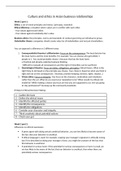Overig
Culture and Ethics in Asian Business Relations samenvatting
- Instelling
- Avans Hogeschool (Avans)
A summary of the luctures and powerpoints of Culture and Ethicsin Asian Business Relations for international business at avans Breda year 1 quarter 1.
[Meer zien]




